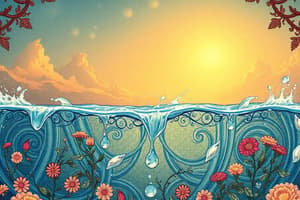Podcast
Questions and Answers
What is the primary source of energy required for evaporation to occur?
What is the primary source of energy required for evaporation to occur?
- Energy from the sun (correct)
- Wind patterns
- Topography
- Temperature
What is the process by which water vapor is transformed back into liquid water?
What is the process by which water vapor is transformed back into liquid water?
- Condensation (correct)
- Evaporation
- Transpiration
- Precipitation
What is the term for water that falls from the atmosphere to the Earth's surface?
What is the term for water that falls from the atmosphere to the Earth's surface?
- Condensation
- Runoff
- Evaporation
- Precipitation (correct)
What occurs when precipitation exceeds the ability of the soil to absorb water?
What occurs when precipitation exceeds the ability of the soil to absorb water?
What is the term for the process by which plants release water vapor into the air?
What is the term for the process by which plants release water vapor into the air?
What is the result of water flowing over the Earth's surface?
What is the result of water flowing over the Earth's surface?
Flashcards are hidden until you start studying
Study Notes
Water Cycle Processes
Evaporation
- The process by which liquid water is transformed into water vapor
- Occurs at the surface of the Earth, such as oceans, lakes, and rivers
- Also occurs through plant transpiration and soil evaporation
- Energy from the sun is required to evaporate water
- Water vapor rises into the air as gas molecules absorb heat
- Rising air currents carry water vapor upward into the atmosphere
- Higher in the atmosphere, water vapor condenses into tiny droplets
- Forms clouds, fog, or dew, depending on the conditions.
Evaporation
- The process by which liquid water is transformed into water vapor
- Occurs at the surface of the Earth, such as oceans, lakes, and rivers
- Also occurs through plant transpiration and soil evaporation
- Energy from the sun is required to evaporate water
- Water vapor rises into the air as gas
Condensation
- The process by which water vapor is transformed back into liquid water
- Occurs when water vapor cools and changes state from gas to liquid
- Forms clouds, fog, and dew
- Releases heat energy into the atmosphere
Precipitation
- The process by which water falls from the atmosphere to the Earth's surface
- Forms of precipitation include rain, snow, sleet, and hail
- Occurs when air reaches its dew point and can no longer hold water vapor
- Precipitation can be influenced by wind patterns, topography, and temperature
Runoff
- The process by which water flows over the Earth's surface
- Occurs when precipitation exceeds the ability of the soil to absorb water
- Can collect in low-lying areas and flow into streams, rivers, and lakes
- Runoff can cause erosion and transport sediment and nutrients
Transpiration
- The process by which plants release water vapor into the air
- Occurs through small openings on plant leaves called stomata
- Plants absorb water from the soil and release it as water vapor
- Transpiration is an important part of the water cycle, as it helps to recycle water back into the atmosphere
Water Cycle Processes
Evaporation
- Liquid water transforms into water vapor through evaporation, mainly at the surface of oceans, lakes, and rivers, as well as through plant transpiration and soil evaporation.
- Energy from the sun is required for evaporation to occur, and the resulting water vapor rises into the air as gas.
Condensation
- Condensation occurs when water vapor cools, changing state from gas to liquid, forming clouds, fog, and dew.
- Heat energy is released into the atmosphere during condensation.
Precipitation
- Precipitation occurs when air reaches its dew point, causing water vapor to condense and fall to the Earth's surface as rain, snow, sleet, or hail.
- Wind patterns, topography, and temperature can influence precipitation.
Runoff
- Runoff occurs when precipitation exceeds the soil's absorption capacity, causing water to flow over the Earth's surface and collect in low-lying areas.
- Runoff can flow into streams, rivers, and lakes, and can cause erosion, transporting sediment and nutrients.
Transpiration
- Plants release water vapor into the air through small openings on leaves called stomata, absorbing water from the soil and releasing it as water vapor.
- Transpiration is a crucial part of the water cycle, recycling water back into the atmosphere.
Studying That Suits You
Use AI to generate personalized quizzes and flashcards to suit your learning preferences.




